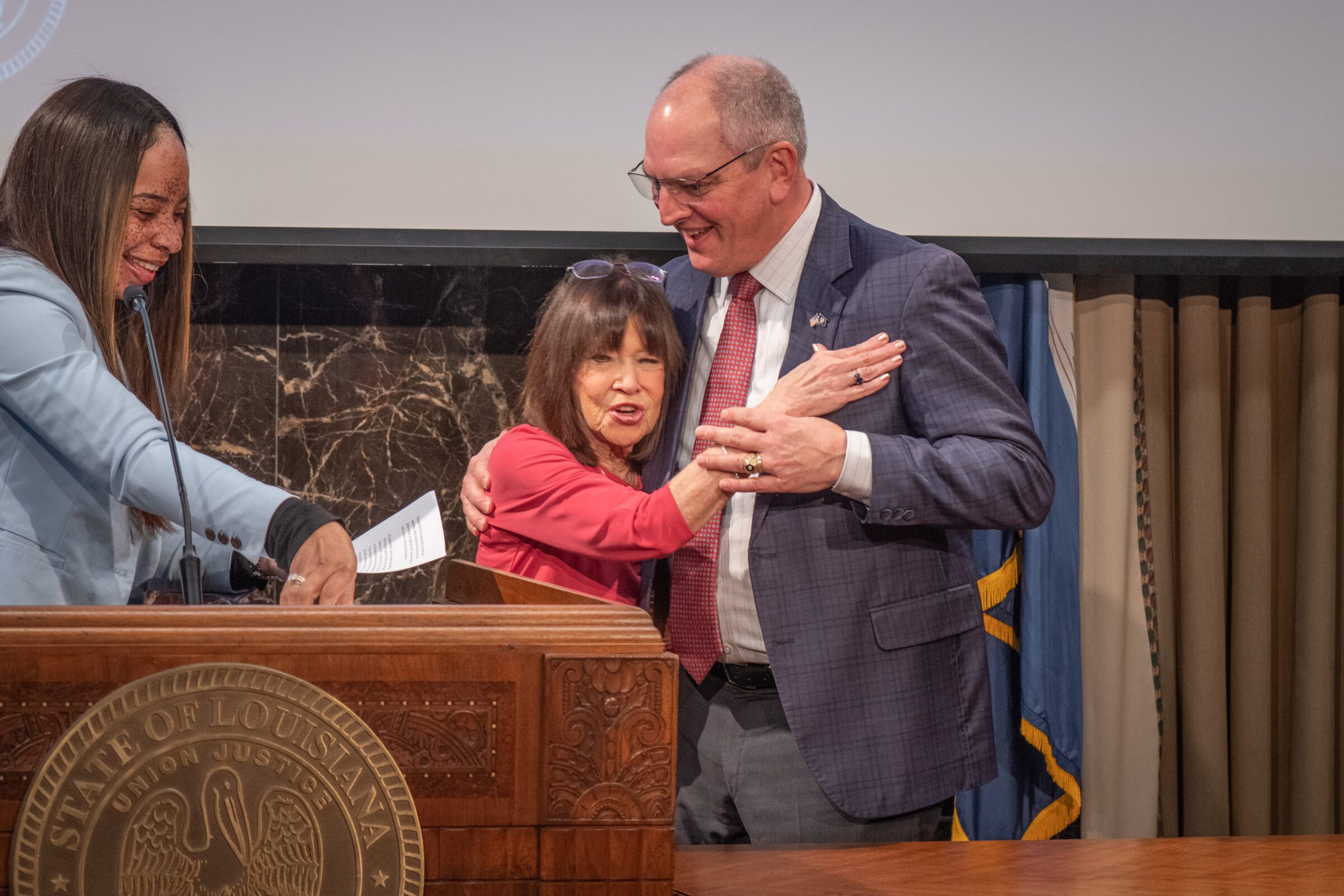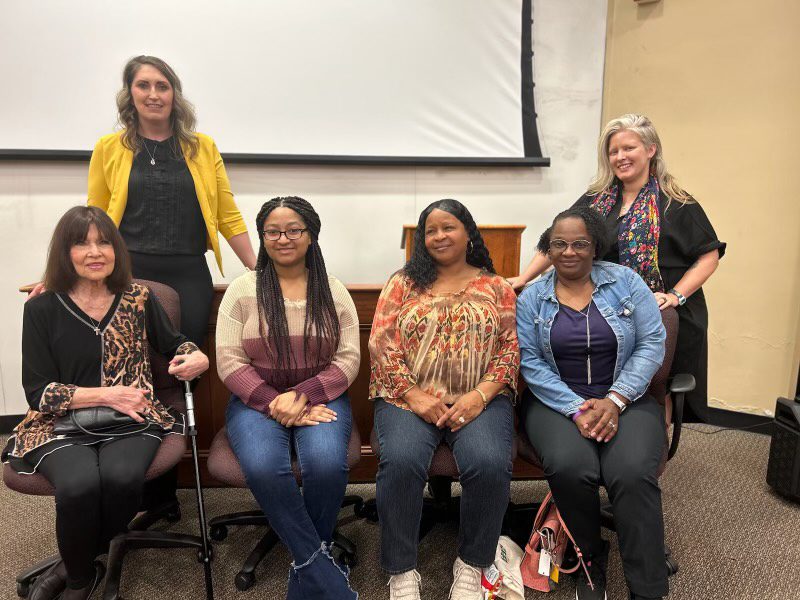Domestic Violence Survivors Seek a Pathway Out of Louisiana Prisons
A bill this session could reduce sentences for people whose convictions stemmed from their abuse.
| April 11, 2023

Nailah Starks doesn’t recall when her father began taking his frustrations with life out on her mother. He would apologize later and promise not to hurt her anymore, only to abuse her again and again—a pattern so common that advocates call it the cycle of violence.
Her mother, Tamika, split with her father when Nailah was in third grade, moving her and her three siblings from New Orleans to Atlanta, but that didn’t stop the violence. She remembers her mom calling the police and begging for help when he assaulted her during one visit, pointing to bruises he had left when the officers arrived and saying, “Look at my face.”
When she was in fourth grade, Nailah and her siblings moved back to Louisiana, but were then abruptly uprooted from their new home in Avondale, across the river from New Orleans, and moved in with an uncle who lived in the small town of Independence, about an hour’s drive north. At first, they were told it was just for a few days, but days turned into months, then years without seeing their parents. Nailah says she assumed that her mother was on a business trip, and that’s what she started telling people until an older cousin corrected her. “Your mom isn’t on a business trip,” he told her. “She’s in jail.”
Nailah later learned that her mother had been charged with the second-degree murder of her father. After a jury deadlocked at her trial, Tamika Starks pled guilty to manslaughter in exchange for a 20-year prison sentence, avoiding a possible sentence of life without parole. “I spent the majority of my childhood angry at her,” Nailah said. She was also angry at her father for putting the family in those circumstances. As the oldest, Nailah felt like she had to parent her four siblings. “I feel like my childhood was taken from me,” she said.
Now a senior in college and a mother herself, Nailah says she has forgiven both parents. And every other week, she drives with her three-year-old son nearly 100 miles to visit her mother in Louisiana Correctional Institute for Women. Tamika always insists on cooking them a pizza she buys at the vending machine, one of the few ways she can still mother her daughter. Each time the visit ends, Tamika’s grandson cries.
Nailah is part of a coalition of Louisiana activists, called Louisiana Survivors for Reform, who have experienced violence, including the murders of their loved ones, and who are pushing for sentencing reforms for domestic violence survivors. They are urging state lawmakers to pass what they are calling the Justice for Survivors Act, filed on March 31 in the state legislature by Senator Regina Barrow, which would enable domestic violence and trafficking survivors behind bars to apply for reduced sentences if their convictions stemmed from their abuse.
The bill would also allow judges to sentence survivors to less time than those dictated by the state’s sentencing guidelines. Barrow says she was moved to introduce the bill after meeting with survivors incarcerated at the Louisiana Correctional Institute for Women. She listened to story after story about women’s attempts to stop or escape domestic violence and, in court, the barriers they faced in presenting evidence of that abuse in their defense.
“It’s very apparent that there’s a gap in our law that does not allow that,” she told Bolts. The Act, she hoped, will provide domestic violence survivors the opportunity to have a fair trial in which all of their circumstances, including abuse, is taken into consideration.
Harsh sentencing isn’t the only way the state of Louisiana fails victims of domestic violence, says Mariah Wineski, executive director of Louisiana Coalition Against Domestic Violence (LCADV). For years, Louisiana has ranked among the top five states for homicides of women murdered by men. In Louisiana, over 90 percent of those killings were by men who knew them and over 50 percent were by intimate partners. “That represents a massive systemic failure,” Wineski said. “We struggle with our systemic responses to domestic violence. In some ways, it’s completely insufficient,” she said, referring to the lack of shelter beds and other resources throughout the state. The scarcity creates a barrier that prevents many survivors from safely escaping abusive relationships. In 2020, the state had only 386 beds in 16 domestic violence shelters. That year, these shelters took in 2,212 people but each year between 2015 and 2020, turned away an average of 2,659 abuse victims.
In other ways, Wineski says, the response—which directs police to make arrests during domestic violence calls and does not take abuse into consideration during prosecution—can be “heavy-handed.”
“When we say survivors are criminalized and incarcerated for killing their abusers, no one [among domestic violence advocates] disagrees with us because everyone knows at least one survivor incarcerated for killing their abuser,” she reflected.
Katie Hunter-Lowrey, herself a crime survivor and an organizer with Louisiana Survivors for Reform, says harsh prison sentences against domestic violence survivors highlights how detached the victim-versus-offender binary painted by politicians and prosecutors is from reality.
“Those of us who have interacted with law enforcement and have been criminalized or victim blamed or denied resources, we know that the system, as it exists, isn’t making us safer,” Hunter-Lowrey told Bolts, “and that those experiences with the system have been further traumatizing when we’re just trying to get and stay safe.”
Like many of the women advocating for Louisiana’s Justice for Survivors Act, Beatrice Taylor spent decades in prison for defending herself and wants to make sure others aren’t similarly punished for it.
In 1997, a jury sentenced Taylor to life without parole for the death of her abusive ex-boyfriend. The pair hadn’t been together long, Taylor recalled but, during their first month, she was already calling police about his violence. Each time she did, he would flee before officers arrived. Even after they split, he continued to harass and assault her. Once, he attempted to rape her, stopping only when she burned his ear with a lit cigarette. Taylor changed the locks, the window panes and even the entire door frame, but he continued to break in. “It wasn’t that I kept letting him come back into my life,” Taylor told Bolts. “He kept breaking into my house.”
The morning of December 2, 1996, after Taylor walked to the corner store to buy a pack of cigarettes, he ambushed her when she got home—first shoving her to the ground, and then pushing her into the kitchen of her small shotgun house. Blocking the front door, he threatened to kill her.
Taylor says she grabbed a kitchen knife—a small one, she clarified—and raised it, yelling “Let me out!” She got halfway across the living room floor when he grabbed the hood of her coat, spun her around, and then started to lunge at her.
Taylor still remembers that moment: His full body weight came crashing down on her left foot, breaking her toes and leaving her in excruciating pain. “Then I saw his fist coming towards my nose as he yelled, ‘I will kill you now,’ and I raised my forearm so he wouldn’t hit my nose,” she recalled. “And I still have a knife in my hand.”
Taylor maintains that she didn’t realize that he had lunged into the knife. Instead, she focused on escaping—hobbling down the stairs and across the parking lot to a pay phone to call 911 yet again. This time when police arrived, he was dead.
The prosecutor didn’t see it as an accident or self-defense, charging her with second-degree murder. While preparing for trial, Taylor learned that her former boyfriend had a history of domestic violence, a history that was never introduced in court. The jury found her guilty. Taylor was sentenced to life without parole or, as she puts it, “death by incarceration.” She was one of 1,868 women imprisoned in Louisiana that year (and, anomalously, one of 590 white women compared to 1,275 Black women).
By 2016, Taylor had long exhausted all of her legal appeals. The laws around domestic violence and self-defense remained unchanged. Her only hope was clemency, or a shortening of her sentence, and she already knew that Republican Governor Bobby Jindal had signaled that he was reluctant to grant clemency. But John Bel Edwards, a Democrat, had replaced him earlier that year.
One morning, Taylor picked up two bundles of a Catholic newspaper to bring to the prison chapel, where she worked and saw that Edwards, who is Catholic, had taken office. Instead of reporting to work, Taylor, who is also Catholic, sat on the chapel steps, opened the newspaper and read a speech they had reprinted from the new governor.
“I could feel the compassion in his words and I said to myself, ‘It is time,’” Taylor recalled. But after she began preparing her clemency petition, the prison flooded, destroying all documents and displacing the women to a shuttered and deteriorating juvenile prison. Taylor started over again. Three years later, the Domestic Violence Clinic at Tulane Law School picked up her case and presented it to the state’s parole and pardon board. They unanimously approved her petition and sent it on to the governor, who granted her clemency in summer 2020. She was released in October 2020.
Regardless of their conviction, Taylor says every woman she met in prison had similar experiences of violence and abuse. She has been determined to fight for them since getting out. She has thrown herself into advocating for the Justice for Survivors Act since learning about the bill.
In January 2023, members of the state’s Human Trafficking Prevention Commission invited Taylor to speak and introduce the man who had granted her clemency. She accepted, not only to personally thank him, but to seize the opportunity to ask him to sign the Justice for Survivors Act into law.

Taylor shared her story with the commission members, then introduced the governor. When she said his name, he flew from the back of the room to the podium, wrapped his arms around her and gave her a big hug as cameras flashed around them.
But Taylor wants more than just a photo opp with the governor. She wants to see him use his powers to grant clemency to help others still languishing at LCIW and to pass the Act to enable future survivors to avoid her fate. Edwards drew attention early in his first term with a spree of commutations and then picked-up the pace again after securing a second term in 2019, but state advocates have pushed him to do more.
“No one should die of incarceration because she had to choose—instantly—her life over someone else’s,” Taylor recalls telling Edwards when they met.
Time is running out since Edwards’s tenure ends in January. He is barred from running again this fall, and one of the frontrunners to replace him, Republican Attorney General Jeff Landry, is an outspoken foe of decarceral measures, adding pressure for a legislative solution this year.
In 2021, Republican state Senator Patrick McMath filed a resolution to create a Survivor Informed Taskforce to study the link between trauma, abuse, and subsequent incarceration and to make recommendations to Louisiana’s legislature. The task force—which included staff from legislators and the governor as well as prison officials, Wineski, Hunter-Lowrey and advocates for domestic violence victims—found that approximately 75 percent of the people imprisoned at Louisiana Correctional Institute for Women had identified as survivors of violence. The task force recommended several legislative pathways, including adapting affirmative defense statutes to consider self-defense and compulsion or duress, allowing judges to deviate from mandatory sentencing when presented with evidence of interpersonal violence or trafficking, and creating opportunities for resentencing for abuse and trafficking survivors.
The Justice for Survivors Act incorporates these recommendations.
The bill is not the first to address the intersections of abuse and incarceration. In 2019, New York passed the Domestic Violence Survivors Justice Act, which allows a sentencing judge to consider whether abuse was directly related to the person’s conviction, granting them the flexibility to deviate from mandatory sentencing guidelines. The Act also allows incarcerated survivors to apply for resentencing. The Act faced opposition from the state’s district attorneys’ association, which repeatedly claimed that such a law would flood the courts with applications for resentencing.
The predicted flood never materialized. The Survivors Justice Project at Brooklyn Law School has been tracking resentencing applications. Since the Act’s resentencing portion took effect in August 2019, the Project estimates that 100 incarcerated people have filed for resentencing under the Act. Three-quarters are in women’s prisons. Of those 100 people, 40 have been resentenced. Another 31 applications were denied and 28 applications are still pending. As of March 2023, New York prisons incarcerated 31,616 people.
Last year, survivors and advocates testified before the Louisiana Senate about the need for a similar protection. During sessions, it’s not unusual for legislators to be on their phones, chatting with one another or walking in or out of the room. But when Taylor and another survivor shared their stories, senators snapped to attention. “You could see the true perplexity on several of the senators’ faces,” Hunter-Lowrey recalled. “You could see them wondering how a person who called the police, filed restraining orders, [or] legally owned her gun in a state that is very pro gun rights could be sentenced to life in prison for killing an abuser in self-defense.” Despite the hearing, the bill did not make it to the floor for a vote. Advocates are hopeful that it will do so, and pass, this year.

Taylor, who had knee surgery this month, is determined to testify when the hearing is scheduled. She cannot walk, but she plans to borrow a wheelchair from her church and members of the Promise of Justice Initiative have offered to push her across the Senate floor. She knows that, without the law, those she left at LCIW will die behind bars.
From prison, Tamika Starks is allowing herself hope. “After suffering many years of all types of abuse and numerous phone calls to local authorities, I reacted in a manner I will regret all the days of my life,” she wrote from prison. “However, I am not sure which is worse. Given the revictimization i have experienced through my incarceration and in light of the trauma and loss my children have endured, I would rather ball up in the fetal position, cover my face and abdomen, then take a shower in my own bathroom instead of being confined to a facility which feeds the statement my [husband] told me, ‘No one will believe you.’ The Justice for Survivors Act will provide healing to souls which have suffered quietly from the epidemic of Domestic Violence. Additionally, the Justice for Survivors Act will correct a long standing social problem that has divided families and crowded prisons.”
As for her daughter Nailah, advocating for the Justice for Survivors Act is the first she’s publicly speaking about her family’s history with violence. In late February, she appeared on a panel at Louisiana State University to talk about her family’s experiences. All of her siblings came to support her, but she was still nervous.
She hadn’t known that the other panelists all knew her mother. Three were formerly incarcerated survivors themselves; the fourth was a supervisor at the women’s prison. They welcomed and encouraged her, telling her how much they loved her mother.
Starks shared her perspective of being the child of an incarcerated survivor. The attendees—a mixture of college students and community members—were receptive and engaged and she felt that she allowed them to see the ways in which incarceration affected not only her mother, but their entire family.
She plans to continue sharing her experience and hopes that her college schedule will allow her to testify at the yet-to-be-scheduled legislative hearing about the bill. Meanwhile, she plans to attend the annual Survivors of Violence lobby day at the capitol in late April, the first time she will ever engage in direct advocacy.
“As a child of a domestic violence survivor, you don’t want to talk too much or say too much,” Nailah reflected. “You’re told that what you have to say isn’t important, so you stay quiet and hope for the best. But eventually you learn you’re not the only one so you have to say something.”

